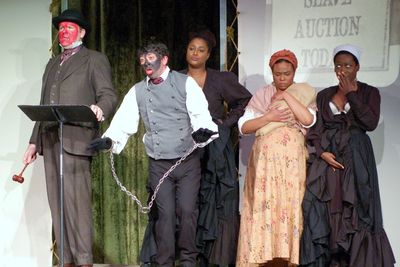As 2016 winds down, the Unicorn Theatre is presenting its riskiest and most intellectually challenging play in recent memory. An Octoroon is a meta-deconstruction of theater, society, race, spectacle and cultural appropriation, as told through the 19th century.
Let me try to explain.
In 1859, Irish playwright Dion Boucicault presented a play on Broadway called The Octoroon (the term means one-eighth black). It was a melodrama about a Southern plantation facing financial ruin and how the man who inherited it falls in love with a girl who was born after his uncle had sex with a slave woman. The slaves are kind of happy because the plantation is good to them. In 2014, playwright Branden Jacobs-Jenkins used that play to explore and explode … almost everything.
An Octoroon begins with a man explaining to the audience what it’s like to be a black playwright, telling stories of therapy and theater, and his thoughts on what we are about to see. Then, accompanied by the music of A$AP Rocky, as well as Peaches’ classic “Fuck the Pain Away,” we are transported to an 1850s Louisiana plantation.
The play is not easy to fully grasp; during intermission, I heard a man ask his wife whether she was understanding it. That’s because the play offers at least three levels of meaning or commentary. The actual play is presented as it was originally conceived, a melodrama. This means over-baked dialogue and over-exaggerated acting. It’s annoying to most modern audiences. So, the first level of commentary is no commentary – the melodrama itself, as well as the period stereotypes, provides the commentary. The second layer of commentary comes from tweaks in the original show made by Jacobs-Jenkins. For example, there is a white actor in blackface and a black actor in whiteface. And the plantation house maids talk like gossipy ghetto girls in 2014. The third level of commentary is the wrap-around, where the playwright explains what’s going on in his head and thinks about the meaning of entertainment (there is an extra, surreal thing going on involving a rabbit, but we won’t get into that).
The actors all handle the resulting sophistication superbly. It’s a great ensemble cast, but I must say the show itself belongs to Rufus Burns. Not only is he able to share the stage with the incomparable Cinnamon Schultz without looking like an amateur (which is difficult to achieve), but Burns has this kind of charismatic concentration that he applies to whatever he’s doing, whether he’s the black playwright, the dastardly white villain, or the hero white slave owner. It’s almost as if he doesn’t know anything around him exists except himself and whichever role he has at that moment. It’s fascinating to watch. And it’s also very effective.
Damron Russel Armstrong is a veteran Kansas City actor, and he takes the director’s chair for this show. I can’t think of any Kansas City director who would be a better pick. His strengths are his range, his knowledge of stagecraft, and an uncanny ability to hide humor inside of seriousness inside of humor, which is what this show requires.
An Octoroon will leave some audiences feeling nonplussed. Other people may leave with a nagging feeling that the show is somehow racist, but without really knowing why. And some people will embrace the contradictions and meta-theatrical antics, acknowledging that suffering is an important source of entertainment, and that in the end, perhaps that’s all anything is. Entertainment.
An Octoroon plays through Dec. 26 at the Unicorn Theatre, 3828 Main St., Kansas City, Mo. Tickets are available at unicorntheatre.org, at the box office, or at 816-531-7529.
